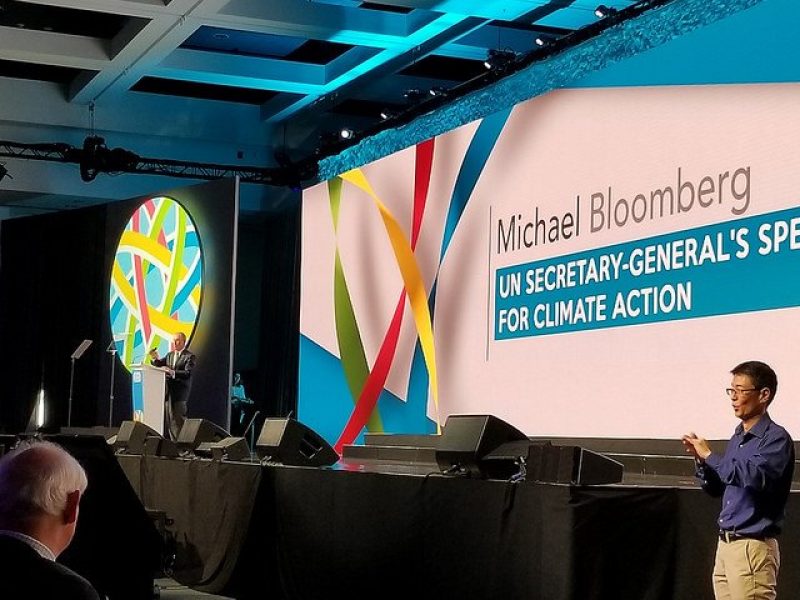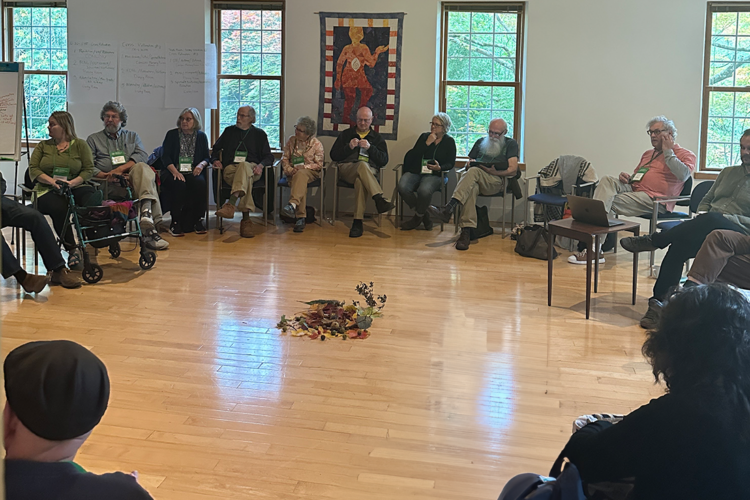The Global Climate Action Summit From the Row behind the VIP Section

By Mica Estrada.
“OUR PLANET IS NOT for sale! Our air and water are not for sale! Our land is not for sale!” This chant rose from the audience as Michael Bloomberg took the stage at the Global Climate Action Summit (GCAS) held in San Francisco, September 13 & 14, 2018. Behind him was a colorful moving background, music and an announcer’s voice characteristic of the Academy Award show. Bloomberg, a co-chair of the GCAS, watched as several people raised a large banner and started the chant. Security, receiving little resistance, escorted the mostly brown-skinned protesters out of the room. Bloomberg quipped something like: “Only in America do environmentalists protest at an environmentalist conference.” This moment captured the complexity of the gathering and the ongoing struggle to command and define the most effective approach to messaging global climate action and a “climate-safe” future.
As a Latina behavioral scientist who studies social influence, and the Director of Climate Education Partners (CEP), at the University of San Diego, perhaps I observed the GCAS through a unique lens. CEP provided climate education and worked with leaders in business, politics, health, transportation, Latinx and Tribal communities. As such, I have spent many years focusing not just on local climate impacts, but on how to do effective messaging (aka education) that results in increased engagement and action among diverse leaders in the San Diego region. Through this lens, I watched the GCAS. As I sat one row behind the VIP section and observed the plenary that included a highly choreographed parade of the elite, it was clear the key message was that significant progress is occurring towards the goals set in the Paris Agreement and these were the reasons why:
1. The US federal government may be hostile and resistant to the Paris Agreement, but US states and cities are completely committed and can show tremendous progress towards those goals. Numerous political leaders described the actions they were taking towards establishing carbon neutral cities and states. California was highlighted as a leading example, showcasing Governor Brown’s recent signing of a bill to transition California to 100% “clean energy” by 2045, but ignoring his more controversial “corporate friendly” decisions to support fracking.
2. Economic prosperity and profit have been decoupled from carbon generation. Former Vice President Al Gore emphasized this message, stating with a booming tenor, “We have decoupled emissions from economic prosperity,” which summarized days of messaging by numerous CEOs and business leaders describing the economic boom they acheived while staying committed to carbon neutral buildings, supply chains, and corporate practices.
3. Worldwide positive things are happening which have exponential impacts to bring the world to carbon neutrality (and arrest the exponential destabilizing impacts resulting from the current trajectory). There was emphasis on technologies and interventions that can grow rapidly, and be effective in addressing the mitigation challenges currently faced. I listened on a simultaneous translation headset as international leaders came forward to describe their efforts, with China having the most impressive imagery of vast fields of solar panels.
As with the work I did with CEP, the summit de-emphasized the terrible impacts of climate change in the world today and instead focused primarily on progress. However, with CEP, we gave equal voice to the people most impacted by climate disruptions, who also have creative solutions to addressing these challenges. At the summit, the plenaries rarely acknowledged how the dominant value of the powerful creates and perpetuates an economy that rests on resource and human exploitation and carbon emissions.
Overall, however, it was an impressive show and it DID feel like a show.
No matter how many beautiful graphics were displayed, it seemed that the heart of the matter was never addressed. To many of us, this is the sense that “the overall increase in global temperatures is the symptom of an underlying spiritual malaise.” Spiritual maturity leads individuals to act with a knowing of interconnection, kindness, generosity, and care for all living things. This orientation to the world provides a practical, material reflection of what mystics throughout the ages have proclaimed: We are One.
Dr. Jane Goodall brought refreshing truth-speaking when she described the deep knowledge and wisdom of indigenous people with whom she has worked, stating, “They understand the spiritual nature of the forest…They haven’t got into our greedy, unsustainable lifestyle…They haven’t got into a cycle of using up more of the natural world than nature can replenish.” Goodall concludes that we all need a more intimate relationship with nature to guide our consciousness and the decisions we make. Her statements, along with breakout session panels that included strong indigenous, youth, African American, Latino, and African voices, ultimately gave a much-needed counter balance to the two-day summit plenaries that otherwise emphasized the agenda of financially powerful change agents.
The voices arising from the community of highly impacted groups, wounded by and not invested in the status quo of what author and activist Joanna Macy calls the Industrial Growth Society, provided truth and ideas for equitable solutions. However, in the main GCAS plenary, this was definitely not central to conveying progress and momentum. Similar to William Penn, current elected officials, business leaders and international investors will continue to wear their sword (expressing ethically driven choices, while taking abbreviated actions that are less likely to threaten the economic status quo) as long as they can.

